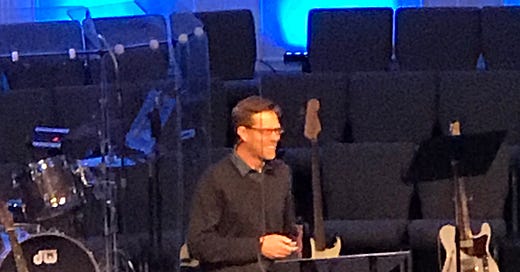I had two interesting online conversations in the last few days. In one, my sociologist friend Jonathan — whose book I used heavily in The Fearless Christian University — asked me to share information I’d presented at SSSR last October. As part of our group’s presentation on themes in Christian universities, I had talked about my analysis of mission statements. The most common theme, I argued, was about preparing students for their future lives as opposed to the specific dynamics of the campus setting and even less about culture war stuff. He is working with a grad student on an analysis of exclusionary orientations of Christian university. My response was that far too often the mission of focusing on student experience and growth gets sublimated to broader institutional concerns like protecting the brand.
The other conversation was with my friend Tom, who was asked by the administration to share his thoughts on chapel. He wrote to pick my brain about anything I’d addressed in the book that might be helpful for their planning.
I actually didn’t write a lot about chapel in my book outside of the expectation that it would remain compatible with the academic mission of the institution. Maybe my skimming over the topic was a reflection of the fact that in 39 years of teaching and administrating in Christian universities, I was asked to speak in chapel exactly once.1 Maybe it was because I complained about chapel programming in my first institution and was told that chapel wasn’t for me but for the students. Maybe it was because students seemed to think chapel was about Worship with a brief message tossed on at the end.2
Because I had recently worked through the FCU copyedits the whole book was fresh in my mind,3 so I actually did have some thoughts to share with Tom. He had noted that there are a variety of different populations present in chapel: athletes or commuters who had limited prior church exposure, homeschooled students who had been raised in very proscribed environments, students from Christian high schools, and Christian students from pretty diverse public schools.
So I told Tom that the first priority of chapel is the spiritual formation of the students. Regardless of the diversity of their backgrounds, we desire to see all of them deepening their spiritual walk. That will look like baby steps for some and will require some deconstruction for those who have foreclosed. For all of them, it will be part of a process of owning one’s faith rather than passively affirming that of parents or home church.
To make this more complicated, student interests change over time. Key issues for freshmen are different than key issues for juniors. The chaplain needs to be fluent in those differences.
In the same vein, the key issues that are important in a student life need to connect to chapel programming. It is a sad thing to have happy and safe chapel addresses one is to affirm while simultaneously struggling with family and relationship issues, mental health challenges, anxiety about the future, or sexual orientation. If the student’s faith is to be strong and vital ten years after graduation, the seeds must be planted now. This is especially true as they will confront future challenges, something I refer to as “anticipatory deconstruction” in the book.
The chaplain and the chapel program need to represent the diversity that is present. Students hold a range of views on race, politics, and LGBTQ+ issues and chapel must be a place that transcends these differences without obscuring them.
Those who speak in chapel need to be sensitive to students’ experiences and issues. I can’t tell you how many chapel addresses I heard from pastors who saw their one chance to speak to issues they had faced at 19: how to find a mate, how to determine your calling, how to commit to Jesus. Again, the focus is not on students’ current state but on their future faith.
Taking the student issues seriously will likely put the chaplain in a highly precarious state. It’s far too easy for a student to text a parent or pastor about what somebody just said in a chapel address, likely with video. It is incumbent on the administration to protect the chaplain and always be willing to provide an affirmative view of the programming that is going on (because they affirm that student growth is crucial).
In the same way, the chaplain and chapel programming should be supported by faculty and staff. They should never be at odds.4 The faculty and staff can provide helpful advice as well as pursuing connections in their own classes or programs. They also add a layer of protection to the chaplain when the inevitable complaints come.
I hope that the chaplain search committee includes a variety of student voices. Not just the worship band, but a cross-section of students who can speak into their desired programming for chapel.
Most Christian universities I know have required chapel. Even those where chapel is voluntary have informal norms that make attendance (if not attention) expected. What is needed is a clear sense of what chapel is for. Maybe then the chapel address won’t feel like an afterthought for once Worship is over.
That had been scheduled for September 11, 2001. Understandably, I got bumped to a later date.
When they could scroll their phones or work on homework.
Page proofs arrive in mid-July!
At one of my institutions, the chaplain told me that his job was to “undue what you and the other faculty are doing the rest of the day”.




